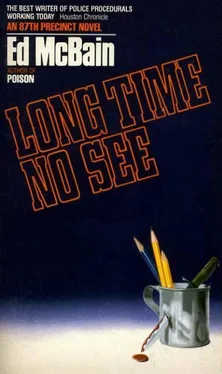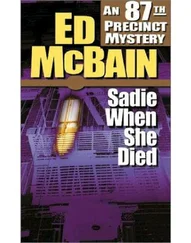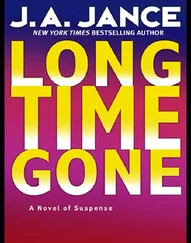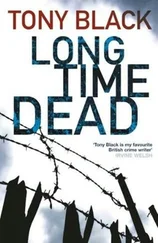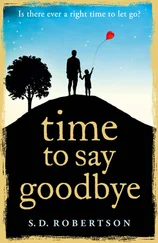“This isn’t a homicide,” Underhill said. “This isn’t even an assault, you want to know. Guy tried to attack a blind man, and the dog bit him.”
“Where?”
“Where’d he bite him? We don’t know.”
“I mean, where did the attack take place?”
“Cherry and Laird.”
“All the way down there, huh?”
“Yeah. Well, I got work here, thanks a lot, huh?” Underhill said and hung up.
Grossman put the receiver back on the cradle, thought for a moment about the odds against Underhill’s case being related to Carella’s, and decided to call the Eight-Seven, anyway.
Genero answered the squadroom phone.
“87th Squad, Detective Genero,” he said. He always made sure he gave his title. Every other detective on the squad merely gave a last name; Genero gave any caller the full treatment.
“This is Sam Grossman at the lab,” Grossman said. “I’d like to talk to Carella.”
“Not here,” Genero said.
“Where is he?”
“Don’t know,” Genero said.
“Do you have any idea when he’ll be back?”
“Nope,” Genero said.
“Who’s working the blind-man case with him, would you know?”
“Meyer, I think.”
“Is he there?”
Genero looked around the squadroom. “No, I don’t see him.”
“Well, ask either one of them to call me back as soon as possible, would you?”
“Will do,” Genero said.
“In fact, let me talk to the lieutenant.”
“I’ll have the desk sergeant transfer you,” Genero said. He jiggled the receiver bar, and when Murchison came on the line, he said, “Dave, put this through to the lieutenant’s office, will you?”
Grossman waited. For a moment he thought he’d been cut off.
“87th Squad, Byrnes.”
“Pete, this is Sam Grossman at the lab.”
“Yes, Sam, how are you?”
“Fine. I’ve just been talking to a detective named George Underhill at the Four-One, he’s working a case with a blind victim.”
“A homicide?”
“Attempted assault. I have no idea whether this is related to Steve’s case or not, but it might be worth contacting Underhill.”
“Right, I’ll pass it along to Steve.”
“The perpetrator was bitten by the victim’s dog,” Grossman said. “You might want to put a hospital-stop on it right away.”
“Didn’t Underhill do that?”
“I don’t know.”
“I’ll put somebody on it,” Byrnes said. “Thanks, Sam.”
“Don’t mention it,” Grossman said, and hung up.
Byrnes put up the phone and went out into the squad-room. Genero was staring at a pair of pale blue bikini panties on his desk. Byrnes said, “What are you doing with those panties, Genero?”
“They’re evidence,” Genero said.
“Of what?”
“Fornication,” Genero said.
“I wouldn’t be surprised,” Byrnes said. “Call the Department of Hospitals, put a stop out for any dog-bite victims. Ask them to refer back to Carella of the Eight-Seven.”
“Is that what Captain Grossman wanted?”
“Yes, that’s what he wanted.”
“Does that mean I don’t have to tell Carella he called?”
“Leave a note on Carella’s desk.”
“Meyer’s, too?”
“Meyer’s, too.”
“Shall I call the Department of Hospitals first?”
“If you think you can handle three things in a row without forgetting any of them.”
“Oh, sure,” Genero said.
The supreme court magistrate read Carella’s affidavit, and then said, “What is it you want in that safety deposit box, Detective Carella? It doesn’t say what you want.”
“That’s because I don’t know what’s in it, your Honor,” Carella said.
“Then how can you expect me to sign an order commanding you to open it?”
“Your Honor,” Carella said, “as you’ll note in the affidavit, this is a homicide I’m investigating, and I have reason to believe that whatever the murderer was searching for in the apartment of two of the victims—”
“Yes, yes, that’s all here.”
“Might be in the box, your Honor, and might constitute evidence of the crime of murder.”
“But you don’t know what you’re looking for specifically,” the magistrate said.
“No, your Honor, I do not.”
“Do you have any personal knowledge of the existence of such evidence?”
“Only knowledge based on the fact that the murderer thoroughly searched the apartment for something, your Honor, as stated in the affidavit.”
“That is not personal knowledge of evidence in the box,” the magistrate said.
“Your Honor, I don’t think this would constitute an illegal search, any more than going through a victim’s dresser drawers would constitute an illegal search at the scene of the murder.”
“This is not the scene of a murder.”
“I realize that, your Honor. But I’ve had a court order, for example, to open a safety deposit box when all I was investigating was a numbers operation, a policy operation, your Honor, and this is a homicide.”
“In this other case, did you have personal knowledge of what you would find in the box when it was opened?”
“I had information from an informer.”
“That constitutes personal knowledge,” the magistrate said.
“Your Honor, I really would like to open that box. Three people have been killed already, all of them blind, and I think there may be something in there that can help me. There’s probable cause to believe there’s something in there, your Honor.”
“If I issued this warrant, it might do you more harm than good,” the magistrate said. “Your application might later be controverted on a motion to suppress the evidence seized under it.”
“I’d like to take that chance, your Honor,” Carella said. “Your Honor, there’s no one who can be hurt here but the killer. We’re not violating the victim’s rights by opening that box, your Honor.”
“I’ll grant the warrant,” the magistrate said.
On the way uptown Carella wondered why the judge had given him such a hard time. He guessed the hard time was worth it. He guessed that protecting the rights of one person was the same as protecting the rights of all persons. It was almost two-thirty when he got back to the squadroom. He intended stopping by only to tell Byrnes where he was going and what he was about to do. It was good to give progress reports when the lieutenant was complaining about lack of progress. Genero was sitting at his desk, looking at a pair of pale blue bikini panties.
“I put a note on your typewriter,” Genero said.
“Thanks,” Carella said, and pulled the note from the roller. It told him that Grossman had called. Grossman was spelled “Grosman.” Carella was about to call him back when Byrnes came out of his office and told him about Underhill, and the attempted assault, and the dog bite. Carella said, “Okay, good,” and filled him in on the safety deposit box and the court order, and then turned his name-plaque to the wall on the Duty Chart, and went downstairs again to where the dog was dripping spit all over the back seat. He tried to remember the dog’s name, but couldn’t. Nobody’s perfect.
The manager of the First Federal on Yates Avenue was a black man named Samuel Hobbs. He welcomed Carella into his office, shook hands with him, and then studied the court order with a solemnity befitting a command for a royal beheading. Carella extended the Mosler key to him. Hobbs pressed a button on the base of his phone. A black girl in her early twenties came into the office, and Hobbs asked her to locate the box number of James Randolph Harris and then escort Detective Carella to the vault and open the box for him. Carella followed her. She had long slender legs and a twitchy behind. She found the number of the box in a card file, and then led him into the vault. She smiled at him a lot; he was beginning to think he was devastating.
Читать дальше
